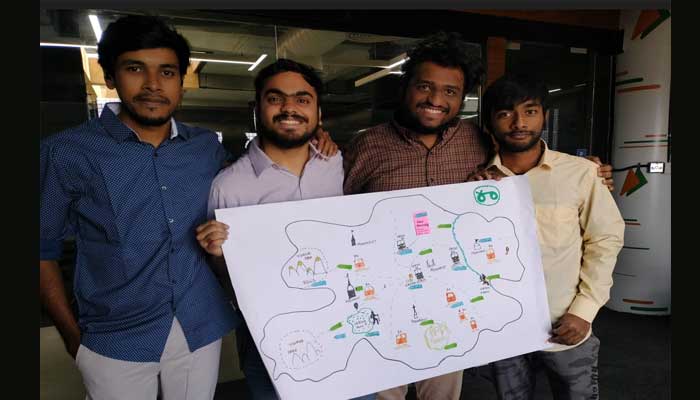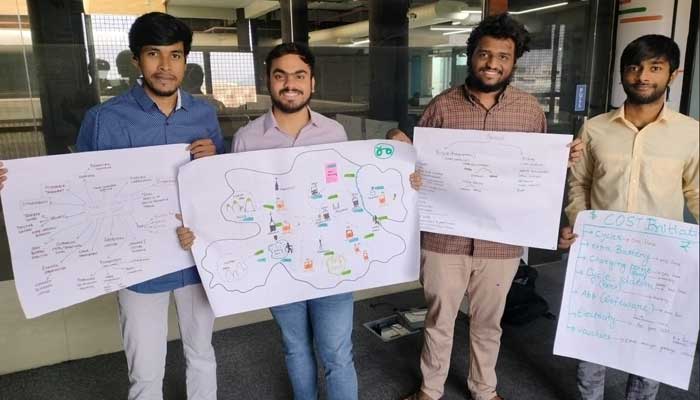At the recently concluded national level Sustainability hackathon organised by Goa Institute of Management’s Centre for Excellence in Sustainable Development (CESD), a team of 4 from IIITH bagged the first prize of INR 25,000 with their e-bike rental solution for sustainable hospitality and tourism.
Goa Institute of Management’s Centre for Excellence in Sustainable Development (CESD) organises an annual flagship event, a sustainability hackathon that brings together teams of students and professionals from various disciplines to work on real-world sustainability challenges. Additionally, the event provides a platform for participants to showcase their creativity, critical thinking, and problem-solving skills. With this year’s theme being sustainable hospitality and tourism, over 200 teams participated from which 5 were shortlisted to the final round. Team Sankalp from IIITH comprising MTech PDM (Product Design and Management) students Deepanshu Garg, Karthik Konar, Bishwajeet Pal along with BTech student Ganne Jyotheeswar under the mentorship of Prof. Raman Saxena submitted an innovative e-bike solution winning the first prize.
Tourist Traffic and Congestion
“A four-credit course titled “Design Thinking” which I have been teaching to the PDM and other students, served as a platform to approach this service design challenge,” says Prof. Raman who guided the team to implement design thinking methodology including human/user-centred approach and empathy during the research and ideation phase by putting the users at the centre of the process. In this case, the users are tourists as well as other stakeholders. While brainstorming on users’ problems, the team drew upon a combination of personal experiences along with initial research and discovered that the top two ills currently plaguing the tourism industry are traffic congestion and pollution due to tourist traffic. In order to test it out, the team embarked upon a visit to some of the lesser known beaches of Andhra Pradesh – Chirala and Suryalanka respectively. “The coastline is stunning there but commuting was an expensive affair,” says Deepanshu Garg, adding that even the locals were facing traffic congestion issues. From similar case studies, they found that traffic congestion leads to a negative impact on the environment, locals and tourists which could be countered by using electric bikes.

E-bike Limitations And Sankalp’s Solutions
Cycles and e-bikes are the new future of sustainable tourism. There are a few Indian states that are actively promoting the usage of e-bikes for tourism. Terming it an apt solution, Deepanshu however rues that gaps exist in their current services. “We found that in tourist destinations, you can hire an e-bike at a certain location, but returning it at the same spot where you hired it from is a big pain. Plus, charging of these bikes takes time and waiting is not really an option. So our solution essentially proposes changes in the existing value chain of e-bike services in India,” explains Deepanshu. The team displayed a keen understanding of management practices that they deployed in their solution by adopting the blue ocean strategy – where the unexplored market space is tapped into. “Our target areas were tier-2 and tier-3 cities as well as university campuses where the young and environmentally-aware youngsters commute,” says Karthik.
They also applied the principles of Design Thinking in the creation of their solution. “For eco-conscious tourists, we added a special feature of a recycling bin to the e-bike. We also proposed battery replacement in lieu of waiting for the bikes to be charged saving precious time,” enumerates Bishwajeet. Besides this, Team Sankalp provided a detailed implementation plan of rental e-bikes along with a tentative financial budget. “An innovative solution best suited to the context of sustainable tourism was arrived at keeping all the stakeholders in perspective. This challenge allowed the team to apply the learnings from the course to a real-world scenario and to put the knowledge learned into action,” remarks Prof. Raman. The end-to-end solution is what set out their submission from the rest.



Next post